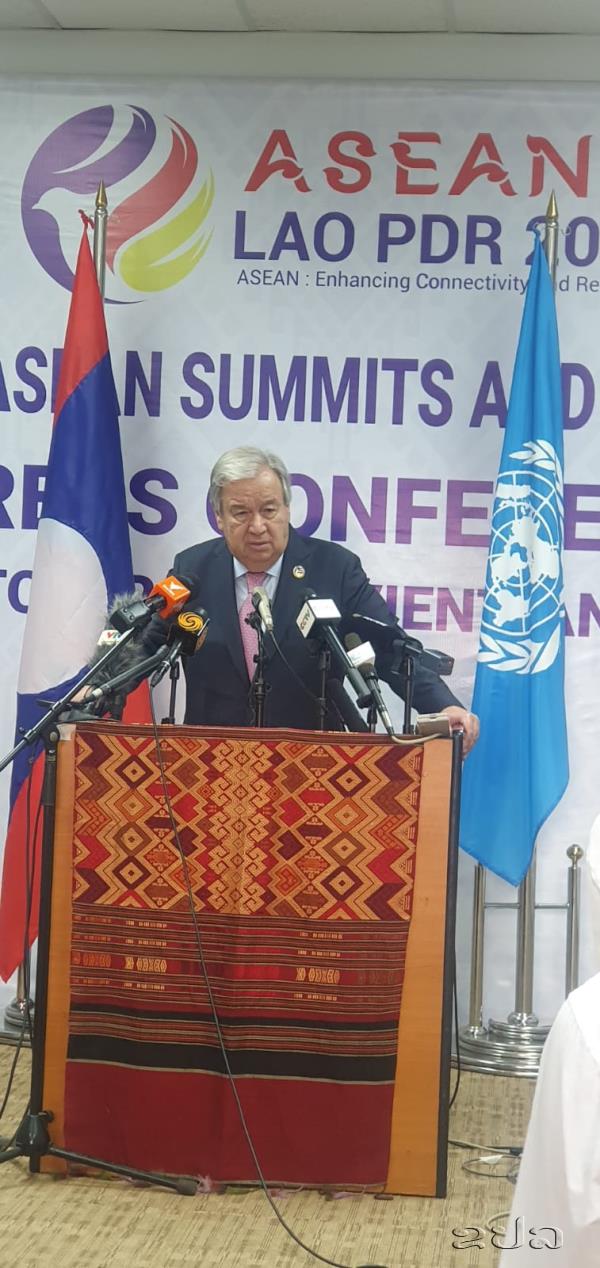KPL
On October 11, in Vientiane, United Nations Secretary-General Antonio Guterres held a press conference emphasizing the growing partnership between ASEAN and the UN.

(KPL) On October 11, in Vientiane, United Nations Secretary-General Antonio Guterres held a press conference emphasizing the growing partnership between ASEAN and the UN.
He highlighted the strong collaboration between the two, describing it as a strategic partnership that is advancing across political, security, economic, and cultural fronts through the ASEAN-UN Plan of Action.
Guterres expressed his appreciation for ASEAN’s contributions to UN peacekeeping operations, particularly extending solidarity to Indonesia, following the recent wounding of two Indonesian peacekeepers in Lebanon by Israeli fire.
Allow me to express my total solidarity with the Indonesian delegation. Two Indonesian peacekeepers [serving in Lebanon] were wounded by Israeli fire. We are together with you and the Indonesian people at this time, according to press release.
Looking to the future, Guterres commended ASEAN’s focus on forward-looking initiatives, such as the preparation of the ASEAN Community Vision 2045, while also linking these efforts to the UN’s newly adopted Pact for the Future. He identified four key areas for continued collaboration between ASEAN and the UN:
1. Connectivity and Technology:
Guterres emphasized the need to close both the digital and emerging Artificial Intelligence divides. He announced that the UN's Pact for the Future includes a breakthrough agreement on the global governance of AI, giving every country a voice in AI development and governance. The UN will also support international partnerships to boost AI capacity-building in developing countries.
2. Finance Reform:
The Secretary-General underscored the inadequacies of the current international financial system in providing sufficient support to developing nations. He called for accelerated reform of the financial architecture to close the financing gap for the Sustainable Development Goals (SDGs). He also urged G20 countries to lead an SDG stimulus of $500 billion per year, alongside boosting lending capacities of multilateral banks and restructuring debt for countries in crisis.
3. Climate Action:
Guterres warned of the escalating climate crisis, citing ASEAN countries’ vulnerability to climate disasters like Super Typhoon Yagi. He called on the G20, responsible for 80% of global emissions, to lead efforts in reducing emissions. He also commended the Just Energy Transition Partnerships in Indonesia and Vietnam, stressing the need for all countries to submit new, stronger Nationally Determined Contributions (NDCs) aligned with limiting global warming to 1.5°C. He further urged developed nations to fulfill their commitments on adaptation finance and contribute to the new Loss and Damage Fund.
4. Peace and Security:
Guterres praised ASEAN's role in fostering dialogue and peaceful resolutions in disputes, including on the Korean Peninsula and the South China Sea. He voiced deep concern over the worsening situation in Myanmar, with growing violence and a severe humanitarian crisis. He reaffirmed the UN’s support for ASEAN's efforts, including the ASEAN Five-Point Consensus, to find a peaceful, inclusive solution to the conflict in Myanmar.
He also spoke about the critical need for peace worldwide, addressing conflicts in Gaza, Lebanon, Ukraine, Sudan, and Myanmar, noting the unprecedented scale of destruction in Gaza. Guterres commended ASEAN for its role as a "bridge-builder" in the international arena, promoting peace, security, and sustainable development.
In closing, Guterres reiterated his full support, along with that of the United Nations, for ASEAN’s ongoing efforts to build a prosperous, inclusive, and sustainable future, with respect for human rights at its core.
KPL